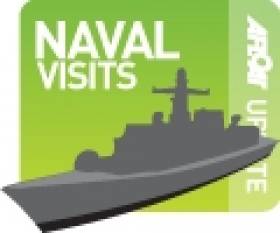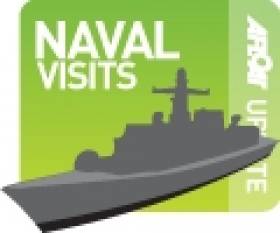Displaying items by tag: Battle of the Atlantic
#BattleofAtlantic – The Mersey will yet again be witness in marking another historic occasion tomorrow as the Battle of The Atlantic (on it 70th anniversary) is to be commemorated for the final time in the UK, writes Jehan Ashmore.
A unique opportunity to take part in the final ceremony is by taking a farewell cruise, as naval vessels from countries throughout Europe, Russia, US and Canada are to depart Liverpool. The event has also been commemorated in London and Derry-Londonderry.
The international flotilla which has spent the last few days in Liverpool represent both sides of the conflict which ran the entire length of the Second World War, from 1939 to 1945. The Battle of the Atlantic was pivotal to the success of the allied side, though the loss of life was horrific on both sides as highlighted on the Royal Navy BOA70 commemorative website.
Among the commemorative naval flotilla is HMS Edinburgh (D97) the last Type 42 destroyer in the Royal Navy fleet which is to decommission in Portsmouth in early June. It is apt her visit to Merseyside as she was launched in 1983 across the river on the Wirral Peninsula at the Cammell Laird shipyard.
#BattleofAtlantic- For five days, Liverpool is to host the 70th and final UK anniversary commemoration of the Battle of the Atlantic between Friday 24 to Tuesday 28 May.
In total there are 25 naval ships calling at the Liverpool Cruise Terminal and at Albert and Canning Docks, with several of these vessels made open to visitors. Naval vessels from the UK, Canada, Germany, Italy, Russia and the US will represent both sides of the conflict which ran the entire length of the Second World War, from 1939 to 1945.
On the final day of the event, Tuesday 28 May, all visiting ships will depart in a coordinated parade on the Mersey. To take part in the maritime spectacle, Mersey Ferries will be joining the flotilla and will follow the ships as they head out of the Mersey. On board the excursion cruise, a Blue Badge Guide will provide live commentary.
Mersey Ferries are to provide two ferries for the Farewell Cruise. The following are departure times for the farewell cruises are as follows: Departing Liverpool at 1.00pm and the other cruises are scheduled to depart Seacombe also 1.00pm and from Woodside at 1.15pm.
Ticket price for the Farewell Cruise are £25.00 per person. Each cruise is approximately 3-4 hours (duration time may vary).
In addition Mersey Ferries are to offer guaranteed parking spaces at both Seacombe and Woodside with a charge of £5.00 per car (noting spaces are limited).
For further details and how to book online visit: www.merseyferries.co.uk/content/Cruises/Cruisedates.aspx






























































